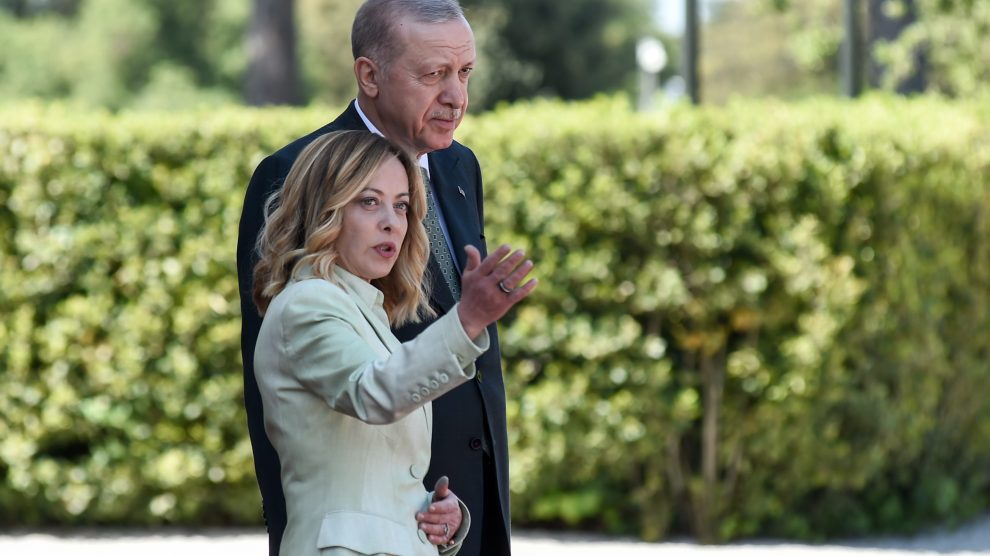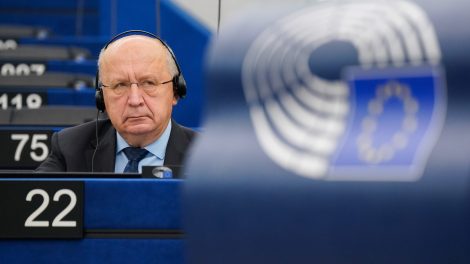Decoding the news. On Tuesday, Italian Prime Minister Giorgia Meloni welcomed Turkish President Recep Tayyip Erdoğan to Rome for the fourth Italy-Türkiye intergovernmental summit.
- The summit has been postponed earlier this month due to the Italian leader’s visit to Washington to discuss tariffs with US President Donald Trump.
- It brought together key ministers from both countries and over 500 businesses for a bilateral Business Forum.
- As the two countries have surpassed their bilateral trade goal of $30 billion, five years ahead of schedule, the leaders have now set a new medium-term target of $40 billion.
What they’re saying. “The joint declaration we adopted confirms the strength of our relationship and lays the foundation to strengthen our partnership further,” Meloni said during a joint press conference with Erdoğan.
- The two nations are cementing economic ties and strategic cooperation in defence, energy, and migration.
- A raft of agreements was signed, including memoranda on industrial cooperation and energy.
- Italy and Türkiye are fast-tracking a comprehensive partnership—from trade to tech to defence—with strategic implications for Europe, NATO, and the Mediterranean.
- “With President Erdoğan, we discussed defence and NATO deterrence, the European continent, and the potential cooperation between our armed forces,” said Italian Defence Minister Guido Crosetto during a visit to Ankara earlier this month.
Focus on defence. A significant highlight is a deepening alliance in drone technology.
- Italian aerospace firm Leonardo and Türkiye’s Baykar Technologies—led by Selçuk Bayraktar, Erdoğan’s son-in-law—recently signed an MoU to launch a joint venture in uncrewed aerial systems (UAS).
- The collaboration aims to tap into Europe’s projected $100 billion drone defence market over the next decade.
- The JV will focus on designing, developing, producing, and maintaining uncrewed aerial vehicles (UAVs).
- Operations will be centred in Italy at sites including Ronchi dei Legionari, Turin, Rome Tiburtina, and Nerviano.
- The two companies also plan to explore synergies in the space sector.
And about GCAP… Italy and Türkiye could potentially align further on next-gen military systems.
- One possibility is cooperation on the GCAP sixth-generation fighter jet program, a joint effort between Italy, the UK, and Japan.
- “We don’t yet know where the drones will go,” said Leonardo CEO Roberto Cingolani. “But we’re sure unmanned systems and new technologies are essential.”
Between the lines. Italy’s partnership with Turkey highlights Ankara’s role as a strategic supplier in Europe’s defence ecosystem, industrially and operationally.
- As the EU considers channelling defence funds only to companies with fully EU-based supply chains, this would sideline firms tied to the US, UK, Japan, and Türkiye.
- Such a restriction is a contradiction for Italy and not only, given its broader defence ties and the need for interoperable, resilient alliances.
What we’re watching. Erdoğan’s visit goes beyond protocol, as Türkiye is a strategic partner for Italy in a shifting Mediterranean, supported by three pillars.
- Strategic necessity: Rome views Ankara as an indispensable—though complex—partner for Mediterranean stability, with shared interests in defence, energy, and high-tech sectors.
- Geopolitical balance: As Ankara reasserts itself in the Eastern Mediterranean, Rome opts for engagement over confrontation to protect its economic and strategic interests.
- Axis of resilience: With the US focus shifting to the Indo-Pacific, Italy aims to build a flexible security axis with Türkiye to anchor its role in a volatile regional landscape.





